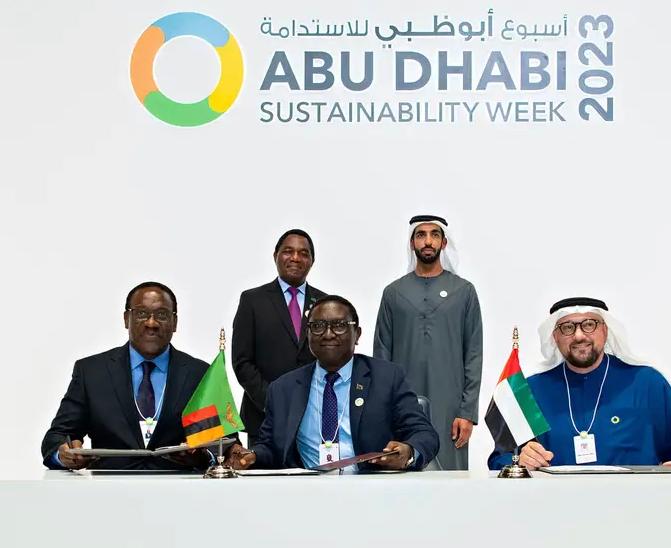(3 minutes read)
Zambia and the United Arab Emirates (UAE) have signed a Memorandum of Understanding (MoU) and Joint Development Agreement (JDA) to facilitate massive investment in the renewable energy sector in Zambia.
Africa received a major boost towards creating sustainable energy in the continent, with the signing of a Memorandum of Understanding (MoU) and Joint Development Agreement (JDA) between Zambia and UAE. The agreements are expected to facilitate massive investment in renewable energy in Zambia. The MoU and JDA will see ZESCO, Zambia’s state-owned electricity company, partner with MASDAR, a key investment funding entity of the UAE, to form a joint venture in developing and deploying large-scale solar projects across the country, estimated at US$2 billion.
The projects will be undertaken in a phased manner, starting with the phased installation of 500 megawatts. Once completed, the projects will result in an additional 2000 megawatts of electricity in the country, within the next few years. This significant increase in electricity supply will be a major boost for the country’s economy, as it will result in more accelerated economic development and increased employment opportunities for the citizens.
In the last 58 years of Zambia’s independence, the country has only developed 3,500 megawatts of electricity as revealed by Zambian President Hichilema. He expressed his immense satisfaction over the renewed confidence of investors in the sound leadership of his country. He anticipates that this would result in more players expressing interest to participate in the country’s planned diversified energy mix, which will include solar, wind, and hydropower.
Read Also;
https://trendsnafrica.com/zambia-resorts-to-power-rationing/
https://trendsnafrica.com/opposition-leader-of-zambia-warns-government-backlash-of-power-shedding/
President Hichilema recently held a meeting with Ali Rashed Alrashdi, the International Holding Company (IHC) Board Chairman, to discuss the citizen’s involvement in conventional small-scale mining. This is with the specific objective to transform Zambia’s artisanal mining sector from a demeaning situation to an environment where one can obtain licenses, capital, and equipment. Additionally, it will facilitate a ready market for the artisanal miners within the vicinity of their operations.





